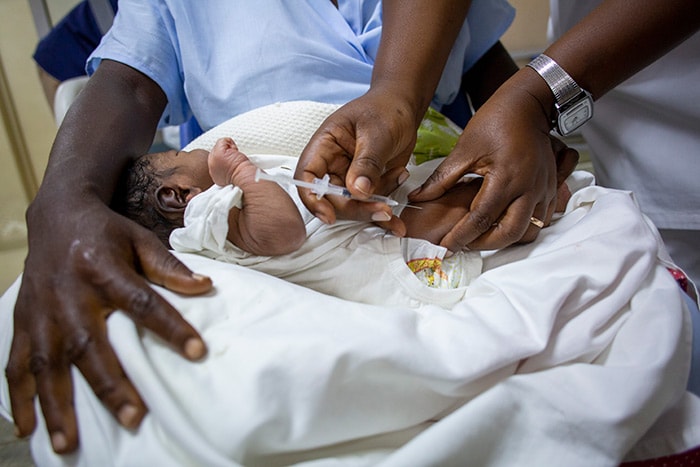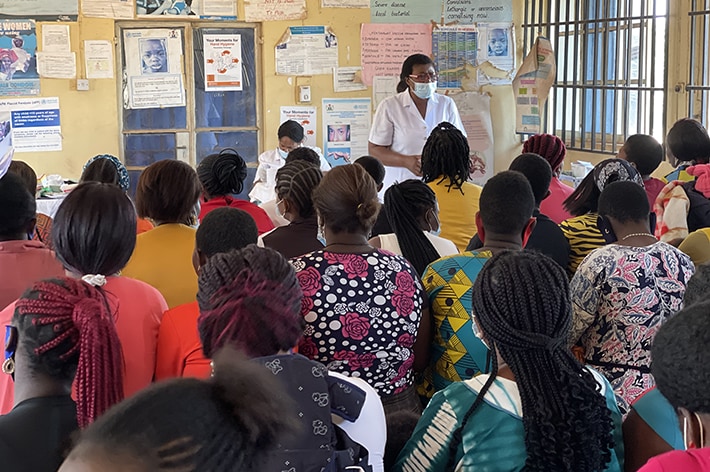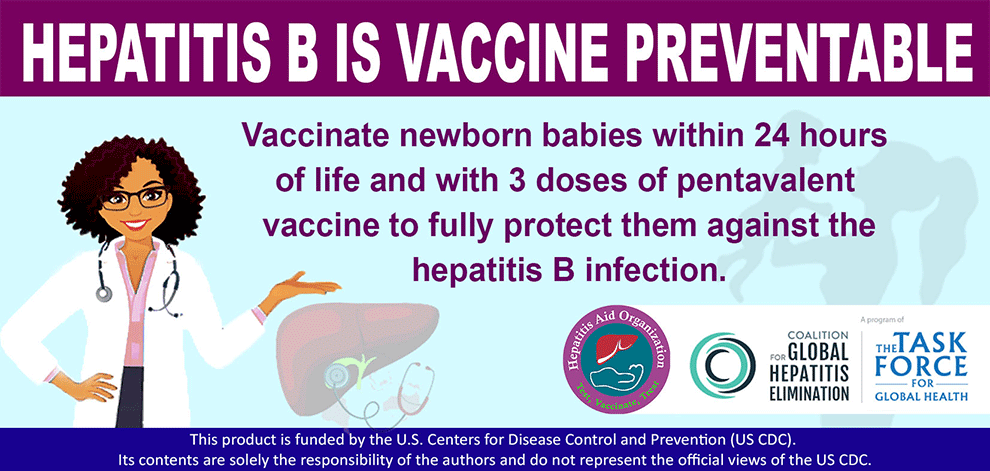World Hepatitis Day 2023
Updated July 27, 2023
Date: July 28, 2023
Theme: Hepatitis Can’t Wait
World Hepatitis Day, recognized annually on July 28, provides an opportunity to raise awareness of the global burden of viral hepatitis. In 2016, the World Health Assembly endorsed the elimination of viral hepatitis as a public health threat, including elimination of mother-to-child transmission of hepatitis B by 2030.

A mother in Angola holds her newborn baby, less than a day old, as he receives vaccines against hepatitis B and tuberculosis.
© UNICEF/U.S. CDC/UN0828235/Prinsloo
Hepatitis B Vaccines Can’t Wait
- Mother-to-child transmission (MTCT) of hepatitis B is the primary source of chronic hepatitis B virus (HBV) infection, the leading cause of cirrhosis and liver cancer.
- Up to 90% of infants infected at birth will develop chronic HBV infection.
- Vaccinating babies against hepatitis B within 24 hours of birth, followed by 2-3 doses within 6 months, will prevent chronic hepatitis B and offer lifelong protection against HBV infection.
In 2022, over half of all newborns worldwide were not protected by a universal hepatitis B vaccine within 24 hours of birth. By supporting the introduction of the hepatitis B birth dose and improving coverage of the full hepatitis B vaccination series, CDC works with partners and countries to reduce the burden of hepatitis B, improve health equity, and advance global health security.
The World Health Organization African Region has the highest number of people living with chronic hepatitis B, but the fewest newborns vaccinated. Only 16 of the 47 countries in the region provide the hepatitis B birth dose vaccine as part of their routine immunization programs. In 2022, CDC, Task Force for Global Health, and the Coalition for Hepatitis Elimination published a hepatitis B birth dose vaccine toolkit for National Immunization Technical Advisory Groups (NITAGs) and Ministries of Health of African countries to aid in their decision-making process about adding the hepatitis B birth dose to existing routine immunization schedules.

Hepatitis B vaccines have been available in Nigeria since 2004, yet Nigeria has the largest number of children living with hepatitis B virus (HBV) infection worldwide. In 2022, only 52% of infants in Nigeria were given the recommended birth dose, and just 62% completed the additional recommended 3-dose series.
CDC, in collaboration with the Nigerian Primary Health Care Development Agency, the African Field Epidemiology Network, and the Hepatitis B Foundation, is working with 40 healthcare facilities in Nigeria to train healthcare workers and community volunteers, with the goal of improving coverage of the hepatitis B birth dose (HepB-BD) and the additional 3-dose series (HepB3).
CDC and partners held trainings on the:
- burden of hepatitis B in Nigeria
- importance of hepatitis B vaccines, especially that the HepB-BD must be given within 24 hours of birth (timeliness)
- recording of vaccine doses in registries
- use of educational materials to raise awareness on the importance of hepatitis B vaccinations with expectant mothers
CDC and partners continue to visit participating clinics and provide technical support. Evaluations are underway and will inform Nigeria’s vaccination program with country specific best practices to help protect future generations of Nigerian children.
Read more about barriers and facilitators of timely HepB-BD and vaccine uptake in Nigeria.
Hepatitis B is a vaccine-preventable disease caused by the hepatitis B virus (HBV). It affects approximately 296 million people globally and is the leading cause of cirrhosis and liver cancer.
The World Health Organization recommends that all newborns receive a hepatitis B birth dose (HepB-BD) vaccine within 24 hours of birth – but by the end of 2022 only 114 of 194 countries provided a HepB-BD to all newborns. In Africa, where the burden of hepatitis B is highest, only 16 of 47 countries provided hepatitis B birth dose vaccination as part of their routine immunization programs. In 2022, only 18% of children in Africa were given a birth dose.
- Digital and Social Media ResourcesShare facts and resources about hepatitis B on World Hepatitis Day
